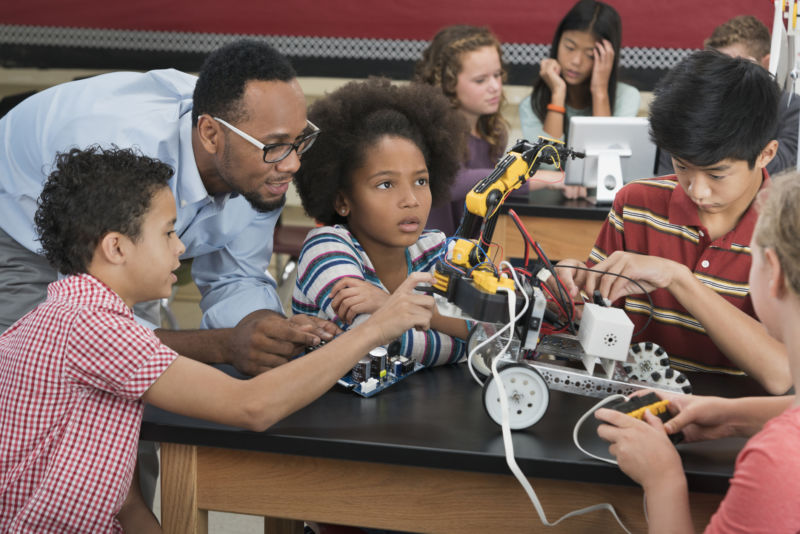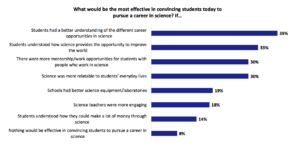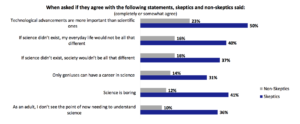
Recently, we had a look at a global survey of the state of science, which tracked the efforts different countries are putting into training scientists and pursuing research. That set of “science indicators” included a bit of information on how the public viewed science, even though that wasn’t the primary purpose of the report.
So we were happy to find out that someone had done a thorough job of looking into the global attitudes toward science. 3M, a company that views itself as research-driven, commissioned surveys in 14 different countries with a mix of developed and developing economies, and the results are pretty encouraging. Despite the many cultural differences, people consistently feel that science has an overall positive impact on global society, and they’re excited by what we learn.
But buried in the positives are a few areas of concern. Most people don’t recognize the impact that science has had on their daily lives and view it as something that their kids might be involved with. Yet younger people are more likely to view themselves as skeptical of science and not trusting of what scientists have discovered.
Ask globally
3M gave Ars a chance to look over the results, and we got to sit down with Jayshree Seth, a chemical engineer who has just been named the company’s first science advocate. “We’re a science-based company,” Seth told Ars, with 8,100 employees globally involved in research and development around the globe. So the company was interested in getting a picture of how the people in areas where 3M operates feel about research and the technology that comes from it. But in looking for surveys that were thorough, comprehensive, and current, Seth said they drew a blank. So they decided to commission their own.
The result is a look at 14 different countries with a mix of economies. On the developed side, there’s Canada, France, Germany, Japan, Singapore, UK, and the US. Brazil, China, India, Mexico, Poland, Saudi Arabia, and South Africa were also surveyed to provide a picture of the attitudes in emerging economies. Each country had roughly 1,000 individuals surveyed, for a global total of more than 14,000 people. Overall, there weren’t huge differences among the countries, suggesting science has truly become a global activity.
But Seth told Ars that the results were mixed. On the surface, people were fascinated about scientific results and hopeful about what science would bring in the future. Beneath that, however, there was skepticism about science’s impact on everyday life and indifference to learning anything more about it—”science is under-appreciated, invisible,” as Seth put it. As a result, the survey revealed a number of seemingly contradictory findings.
For example, globally, about 90 percent of people were hopeful about the technology they felt science would enable, and 87 percent found its results fascinating (the numbers in the US specifically were essentially identical). Yet 86 percent said they knew little to nothing about science. Similarly, more than 90 percent felt that science drives innovation, while 23 percent viewed science and technology as completely separate things. Seth highlighted the irony that many of those surveyed filled in the details online.

Individually, most of the respondents said they were more excited about science as a kid and don’t currently see it as an appealing career option. More than a quarter didn’t see the point in knowing anything about science as an adult. Yet 92 percent wanted their kids to know more about it and felt that they should consider it as a career. As Seth pointed out, this isn’t likely to work out, as kids will pick up on their parents’ indifference.
The genius issue
Part of the problem may be that we go on about the abilities of scientists a bit too much. “We extol the virtues of the genius too much,” Seth told Ars, pointing to the fact that a third of those surveyed said you need to be a genius to go into science. Portraying it as more approachable and providing a range of opportunities for people might go a long way toward eliminating this intimidation factor, even if existing scientists would not receive as many “genius” accolades.
She pointed to other survey results as providing a possible explanation for some of the seeming contradictions. A strong majority, both globally and in the US, viewed scientific progress as being important to society as a whole. But far fewer said that science was important in their daily lives, and most said they simply never think about science. That extended into their views on the utility of science. People were most likely to say that research would have an impact on high-profile items like medical problems and clean energy. But far fewer suggested that science could have an impact on more mundane concerns, like poverty, unemployment, and hunger.

Beyond the confusion within the population at large, the survey also found that a substantial fraction of people labeled themselves as skeptical about science. This group was substantial, at about a third of the respondents globally. These people were on the wrong side of all of the confusion above: they viewed science and technology as separate and accordingly didn’t see any impacts of science in their daily lives. While they tend to be more common in the Middle East and Asia, they’re over a quarter of the US population. And, most worryingly, they tend to be young, with their numbers highest in the 18 to 34 age bracket.
Not surprisingly, these individuals are more likely to view science as boring and rate themselves as knowing little about it. But there’s also a large gap in trust, with 20 percent saying they mistrust scientists and their claims.
Overall, Seth highlighted a number of issues that she hopes to help tackle in her role as a science advocate. One is the attitude of parents. They may want their kids to get a solid science education, but if they’re indifferent to science themselves, their encouragement probably isn’t going to stick.
Another is the large perceived gap between science and tech. Science is behind pretty much all tech these days, but that science may have come decades earlier. “We’ve all become very short term,” Seth said, “and science needs time.” There’s a similar problem with science’s contribution to things like hunger and clean water. “People get the news more on glamorous stuff,” she said, pointing to the excitement that things like new cancer treatments bring.
Part of that, however, could be solved simply by increasing basic science literacy. As Seth highlighted, the more science you know, the more important you tended to say it was.
https://arstechnica.com/?p=1272955

